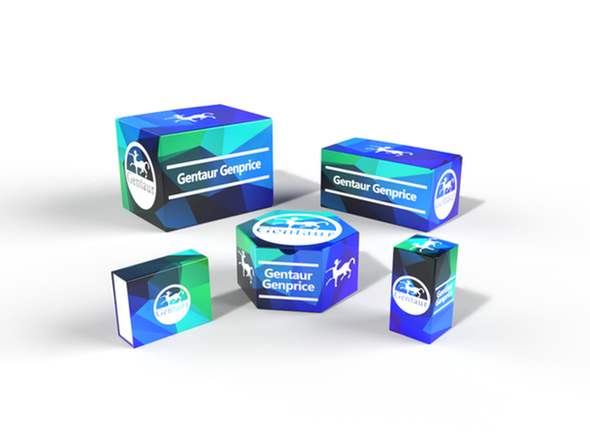Description
SCD5 Antibody | 56-815 | Gentaur UK, US & Europe Distribution
Host: Rabbit
Reactivity: Human
Homology: Predicted species reactivity based on immunogen sequence: Bovine
Immunogen: This SCD5 antibody is generated from rabbits immunized with a KLH conjugated synthetic peptide between 147-175 amino acids from the Central region of human SCD5.
Research Area: Cancer, Obesity, Signal Transduction
Tested Application: WB
Application: For WB starting dilution is: 1:1000
Specificiy: N/A
Positive Control 1: N/A
Positive Control 2: N/A
Positive Control 3: N/A
Positive Control 4: N/A
Positive Control 5: N/A
Positive Control 6: N/A
Molecular Weight: 38 kDa
Validation: N/A
Isoform: N/A
Purification: This antibody is purified through a protein A column, followed by peptide affinity purification.
Clonality: Polyclonal
Clone: N/A
Isotype: Rabbit Ig
Conjugate: Unconjugated
Physical State: Liquid
Buffer: Supplied in PBS with 0.09% (W/V) sodium azide.
Concentration: batch dependent
Storage Condition: Store at 4˚C for three months and -20˚C, stable for up to one year. As with all antibodies care should be taken to avoid repeated freeze thaw cycles. Antibodies should not be exposed to prolonged high temperatures.
Alternate Name: Stearoyl-CoA desaturase 5, Acyl-CoA-desaturase 4, HSCD5, Stearoyl-CoA 9-desaturase, SCD5, ACOD4, SCD4
User Note: Optimal dilutions for each application to be determined by the researcher.
BACKGROUND: Stearoyl-CoA desaturase (SCD; EC 1.14.99.5) is an integral membrane protein of the endoplasmic reticulum that catalyzes the formation of monounsaturated fatty acids from saturated fatty acids. SCD may be a key regulator of energy metabolism with a role in obesity and dislipidemia. Four SCD isoforms, Scd1 through Scd4, have been identified in mouse. In contrast, only 2 SCD isoforms, SCD1 (MIM 604031) and SCD5, have been identified in human. SCD1 shares about 85% amino acid identity with all 4 mouse SCD isoforms, as well as with rat Scd1 and Scd2. In contrast, SCD5 shares limited homology with the rodent SCDs and appears to be unique to primates (Wang et al., 2005 [PubMed 15907797]) .






